|
|
|
Sort Order |
|
|
|
Items / Page
|
|
|
|
|
|
|
| Srl | Item |
| 1 |
ID:
142427
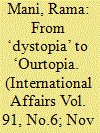

|
|
|
|
|
| Summary/Abstract |
Global governance is in a state of chronic dysfunction. The 70th anniversary of the United Nations offers a timely opportunity to both analyse its disrepair and chart its future through this period of unprecedented upheaval. This article begins with a comparative analysis of two prominent endeavours to redesign global governance in order to address global challenges: the Commission on Global Governance, whose report was launched at the UN's 50th anniversary in 1995; and the Commission on Justice, Security and Governance, which launched its report for the UN's 70th anniversary in June 2015. Despite worthwhile recommendations, both reports suffer from two shortcomings common to such reform efforts. First, pragmatism overrules vision, reducing meaningful global transformation to piecemeal institutional restructuring. Second, the prevailing model of governance, based on nation states and shaped by national interests, remains unquestioned. Such endeavours neither acknowledge nor redress the unfettered pursuit of national interests— geopolitical, economic and military—that caused or failed to prevent today's dystopia of fear and want for most and security for some. The paradigm of global governance needs urgent renewal to equip it to transform this dystopia. This requires two steps. First, looking backwards at the trajectory of philosophical thought on governance and the ideal state, in order to reground global governance in ‘utopian vision’. Second, looking outwards at four unfolding global trends of civics, ethics, physics and metaphysics that are reshaping reality, in order to update global governance to an ‘Ourtopian’ paradigm.
|
|
|
|
|
|
|
|
|
|
|
|
|
|
|
|
| 2 |
ID:
142431
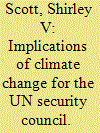

|
|
|
|
|
| Summary/Abstract |
Over the last decade there has been an evolving debate both within the United Nations and within the scholarly literature as to whether it would be feasible, appropriate and/or advantageous for the United Nations Security Council (UNSC) to consider climate change to be within its remit. Given that irreversible global warming is under way and that this will inevitably have multiple global security implications—and indeed, that the Council has to some degree already addressed the issue—such a debate has become anachronistic. What is needed at this stage is nuanced analysis of how this complex policy issue may have already impacted, and may in future impact, the function and functioning of the Council. This article first reviews key variables that need to be taken into account in moving beyond a binary discussion of whether or not the Security Council should consider climate change. It then maps four broad categories of possible UNSC response, spanning from rejection of any involvement through to the Council using its Chapter VII powers and functioning as the peak body in respect of global climate change governance. It then places developments to date within those categories and concludes by considering the prospects for an increased UNSC role in the future.
|
|
|
|
|
|
|
|
|
|
|
|
|
|
|
|
| 3 |
ID:
142433
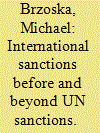

|
|
|
|
|
| Summary/Abstract |
United Nations sanctions are authorized by the international body that is legally charged with the maintenance of international peace and security, the UN Security Council. They are grounded in provisions of the UN Charter. However, only a fraction of all international sanctions are mandated by the UN. One of the findings of this article, which is based on data collected by the Targeted Sanctions Consortium (TSC), is that the large majority of UN sanctions are preceded by non-UN sanctions, particularly sanctions by the United States and the European Union. Furthermore, it is common practice, particularly by the US and the EU, to add sanction provisions of their own to UN sanctions. As a result, for most UN sanctions, there are also non-UN sanctions against the same targets. Such combined sanction regimes add restrictions imposed by only some governments to those that all countries have to implement. Combined sanction regimes are therefore potentially more effective in achieving the targeted outcome than UN sanctions, which represent the lowest common denominator achievable among the members of the UN Security Council. On the other hand, combined sanction regimes might suffer from a type of ‘sanctions fatigue’. A growing number of states outside of the West are openly opposed to unilateral sanctions. Adding non-UN sanctions to UN sanctions might reduce their willingness to support UN sanctions. The TSC data, however, does not support such a contention. Rather, the data indicates that combined sanction regimes are more effective than stand-alone UN sanctions. Still, the US and EU governments—as the main drivers of sanctions policy in general and UN sanctions in particular—need to be aware of this criticism in order not to unwittingly undermine the UN sanctions instrument.
|
|
|
|
|
|
|
|
|
|
|
|
|
|
|
|
| 4 |
ID:
142432


|
|
|
| 5 |
ID:
142428


|
|
|
|
|
| Summary/Abstract |
In the lead up to the 10th anniversary of the Responsibility to Protect (R2P) agreement, pillar II (which refers to international assistance with state consent) was heralded by the United Nations Special Advisor on R2P as the most promising aspect of the Responsibility to Protect. With so little written on pillar II, however, it is difficult to evaluate this judgement. Addressing this lacuna, this article scrutinizes the promise of pillar II to highlight two key strengths. First, the consensual support for pillar II among UN member states reveals that even those that were critical of the R2P in the aftermath of Libya in 2011 still favour the idea of international assistance. At the same time, there remain concerns over the use of force within pillar II as illustrated by events in Côte d'Ivoire in 2011. Second, the utility of pillar II lies in its potential for addressing the threat posed by non-state armed groups. This is particularly important when one considers that in thirteen of the fourteen years since 2000, rebel groups (rather than governments) have been the primary perpetrators of one-sided mass killing against civilians. Accordingly, pillar II can be seen to hold considerable promise for tackling the threat of mass violence by non-state armed groups in the twenty-first century. However, the article also raises concerns over unintentionally legitimizing illegitimate governments through assistance. To illustrate these points it draws on the assistance provided in Mali (2013–15) and Iraq (2014–15).
|
|
|
|
|
|
|
|
|
|
|
|
|
|
|
|
| 6 |
ID:
142436
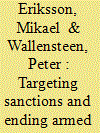

|
|
|
|
|
| Summary/Abstract |
Capitalizing on the newly released dataset on United Nations sanctions and armed conflicts, this article raises the question whether targeted sanctions have an impact on the dynamics of armed conflicts, and, if they do, in what way. To answer this question the authors correlate UN sanctions policies to measures related to armed conflict in the period 1991–2013. This is done by systematizing and analysing data produced by the UN Targeted Sanctions Consortium (TSC) and the Uppsala Conflict Data Program (UCDP). It is a first attempt to deal with questions such as the relationship between UN targeted sanctions and armed conflict type, conflict termination and conflict outcome (victory, peace agreements, etc.). The article demonstrates that there are several instances where the UN has decided not to impose targeted sanctions, although the conditions were similar to those cases that saw such action. There is a tendency to use targeted sanctions only in certain types of conflicts. The authors suggest that this is partly rooted in the structure of the UN as an inter-state organization. Thus, sanctions are more of a political instrument than has perhaps been recognized in sanctions research to date.
|
|
|
|
|
|
|
|
|
|
|
|
|
|
|
|
| 7 |
ID:
142437


|
|
|
|
|
| Summary/Abstract |
This article explores the normative and institutional implications of the long-term use of individual sanctions by the United Nations Security Council (UNSC). It identifies the systematic and extensive use of individual sanctions as the most fundamental qualitative change in international sanctions policy during this century. It argues that policy is developing towards their use not only in order to address international crises and disputes of relatively limited scope and duration, but also to address enduring criminal activities, notably (but not exclusively) related to terrorism. While these sanctions remain associated with threats to international peace and security in the classic sense, they have in many cases transformed into long-term confiscations of individual assets, instead of temporary freezes. The UNSC, designed to address international crises on an exceptional basis, now engages in permanent sequestrations and is tasked with the monitoring of individual criminal activities on a massive scale. While individual sanctions have on some occasions proven effective, their systematic use by inadequate institutions complicates the Council's implementation of sanctions and undermines its legitimacy.
|
|
|
|
|
|
|
|
|
|
|
|
|
|
|
|
| 8 |
ID:
142429
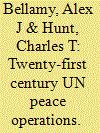

|
|
|
|
|
| Summary/Abstract |
United Nations peace operations are deployed in greater numbers to more difficult operating theatres in response to more complex conflict situations than ever before. More than 100,000 UN peacekeepers are deployed in missions mandated under Chapter VII of the UN Charter to use ‘all necessary means’ to protect civilians from direct harm as well as to achieve a host of other tasks such as supporting the (re)building of state institutions, facilitating humanitarian aid, and overseeing compliance with ceasefire agreements and political commitments. With increasing regularity, UN peacekeepers are instructed to complete these tasks in contexts where there is no peace to keep or where peace is fragile. To understand these changes, and the implications for UN peace operations, this article examines three key transformations: the emergence of the protection of civilians as a central mission goal (and accompanying principles of due diligence); a subtle move away from peacekeeping as an impartial overseer of peace processes towards the goal of stabilization; and a so-called ‘robust turn’ towards greater preparedness to use force. It identifies the challenges posed to contemporary UN peacekeeping operations by these transformations and evaluates the UN's efforts thus far to make peacekeeping fit for purpose in the twenty-first century, noting that while significant progress has been made in areas such as policy and guidance, force sustainment and deployment, and the application of force enablers, there remains a considerable way to go.
|
|
|
|
|
|
|
|
|
|
|
|
|
|
|
|
| 9 |
ID:
142435


|
|
|
|
|
| Summary/Abstract |
Sanctions are frequently applied by the UN Security Council (UNSC) as well as regional organizations. While the objectives sought often vary, a frequent commonality is that they target African states. Indeed, Africa is the most frequently targeted continent by the UNSC and regional organisations including the African Union, Economic Community of West African States and the European Union. However, little attention has been paid to the confluence of this sanctions activity by these different organizations. This article seeks to address this gap in the research. While the UNSC continues to focus on sanctioning to end hostilities, the regional organizations have assigned themselves unconstitutional changes to government as the principal reason to sanction African states. Drawing on data from the Targeted Sanctions Consortium (TSC), this article suggests that: 1) regional organisations are leading UNSC activity more often than is appreciated in the literature; 2) the UNSC has of late been expanding its sanctioning activity to consider issues of democracy and good governance; 3) the UNSC uses sanctions to endorse the activity of African regional organizations to deal with crises on the continent; and 4) UNSC and regional sanctions are intimately tied to crisis management in Africa.
|
|
|
|
|
|
|
|
|
|
|
|
|
|
|
|
| 10 |
ID:
142434
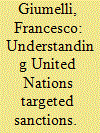

|
|
|
|
|
| Summary/Abstract |
United Nations sanctions have undergone profound transformations in the past two decades. In 1990, the UN Security Council imposed a general, comprehensive embargo on Iraq after its invasion of Kuwait. In 2015, there are 16 Sanctions Committees managing regimes that have little in common with the one imposed against Iraq in 1990. The measures imposed against Iraq were comprehensive, covering all goods coming in and out of the country, while sanctions imposed today are mostly against individuals, non-state entities and are more limited in scope. This article aims to provide empirical and systematic evidence of some of the distinctive qualities of UN targeted sanctions. The analysis identifies three distinctive characteristics of targeted sanctions. First, targeting individuals and non-state actors has permitted the use of sanctions in a wider range of crisis types. Second, the targets of sanctions are substantially different from comprehensive sanctions. Third, the form taken by sanctions is substantially different today from the trade embargoes imposed in the past. The author concludes that the Security Council should devote special attention to the designing and implementation phases of sanctions. The article makes use of the new database prepared by the Targeted Sanctions Consortium (TSC), which includes all cases of UN targeted sanctions.
|
|
|
|
|
|
|
|
|
|
|
|
|
|
|
|
| 11 |
ID:
142426


|
|
|
|
|
| Summary/Abstract |
The 70th anniversary of the signing and entry into force of the United Nations Charter provides a good moment to revisit the conditions under which Allied governments decided to establish the second generation of intergovernmental organization. The wartime commitments to defeating fascism and multilateralism made the establishment of the world organization a logical outgrowth of the wartime origins and the best guarantee of peace and prosperity. Ironically, the ideals of Immanuel Kant were found to be essential to the Hobbesian objective of state survival; multilateralism was a powerful strategy and not merely liberal window-dressing. That historical backdrop is complemented by two largely invisible variables from that time—the role of ideas and of non-state actors—which have since been driving change in the world organization. A future research agenda suggests ways to lift the UN from its current doldrums. Many of the debates and operational activities in the United Nations beginning in the 1970s reflected two topics—interdependence and the proliferation of actors—which profoundly affected what, since the 1990s, we have come to call ‘global governance’. On the positive side, these preoccupations helped us move towards a better understanding of a very complex world. On the downside, they also tend to celebrate unduly the ability of non-state actors and ignore the crucial role of intergovernmental organizations.
|
|
|
|
|
|
|
|
|
|
|
|
|
|
|
|
| 12 |
ID:
142430


|
|
|
|
|
| Summary/Abstract |
The World Health Organization (WHO) occupies a central place in the system of global health governance and plays a key role in the control of epidemics and pandemics. The 2014 Ebola crisis in West Africa, however, saw widespread and sustained criticism of its performance, leading many to call for its reform and even replacement. This article moves on from initial analyses of the WHO's ‘failure’, to argue that the crisis has led to a shift in its authority as a global governor. It argues that the WHO's traditional basis of authority was largely expert and delegated; that it provided technical advice and normative guidance, and that its authority was ‘on loan’ from member states, who exerted considerable influence over the WHO. Its actions during the West African Ebola outbreak remained consistent with this, but it was unable to cope with what the outbreak required. The criticisms both of the WHO and the wider system of global health governance, however, have opened up a space where the balance of authority is shifting to one based more heavily on capacity—the ability to act in a crisis. If such a shift is realized, it will create different expectations of the WHO which, if they are not fulfilled, may lead to trust in the organisation declining and its legitimacy being compromised.
|
|
|
|
|
|
|
|
|
|
|
|
|
|
|
|
|
|
|
|
|